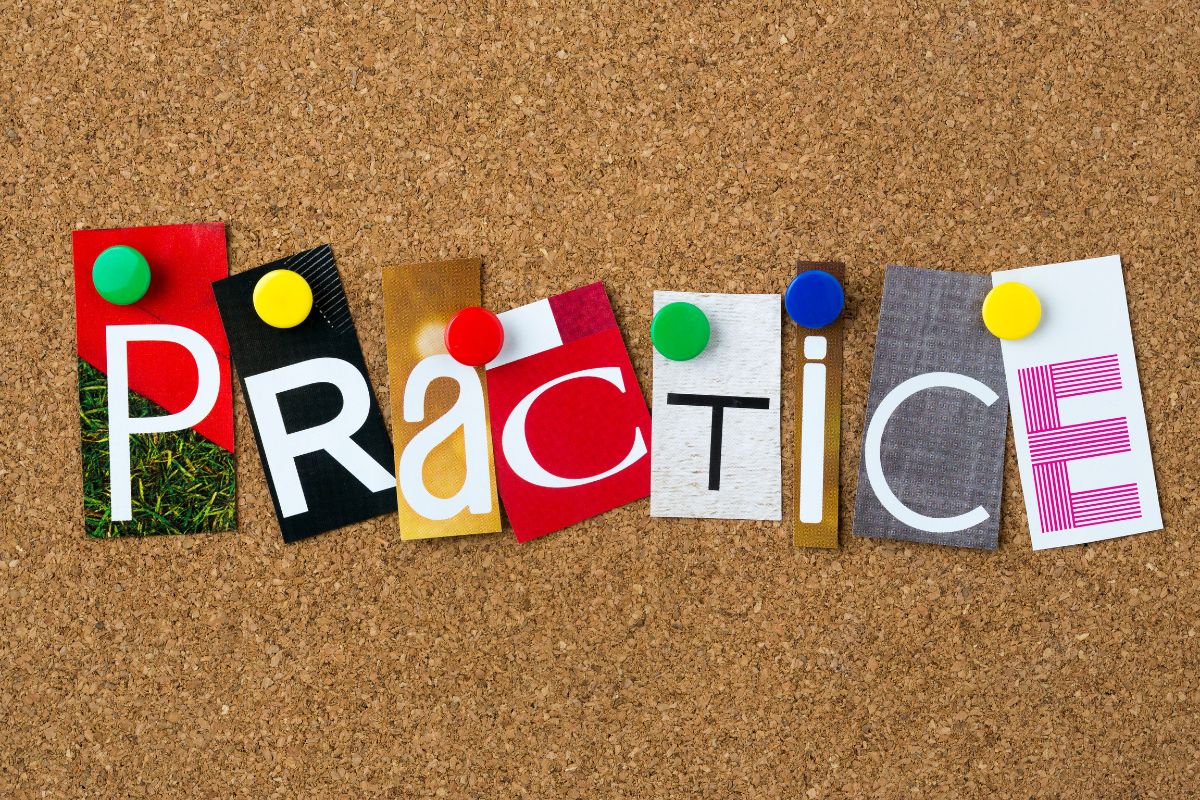To start learning spoken English as a beginner, I believe it’s important to first establish a solid foundation in the basics.
As an English Teacher, I can provide you with personalized tips and guidance to enhance your English speaking skills.
These are 7 tips for beginners to start spoken English:
- Set Clear Goals
- Practice Regularly
- Build Vocabulary
- Focus on Pronunciation
- Join Conversational English Classes
- Embrace Mistakes
- Engage in Language Exchanges
Let’s dive into these tips together and I’ll help you kickstart your journey to becoming fluent in spoken English!
Set Clear Goals:

Before starting, it’s crucial to establish what you want to achieve with your English speaking skills. Do you aim to have casual conversations, give presentations, or something else?
In my classes, setting clear goals is an essential step in helping my students progress in their English learning journey.
By defining specific objectives and milestones, we can create a roadmap for improvement and track their language development over time.
Why Set Clear Goals?
Setting clear goals provides direction and purpose to your language learning efforts. It helps you stay motivated, focused, and accountable for your progress.
Without clear objectives, it can be easy to feel lost or unsure of where to go next in your English learning journey.
Defining Your Objectives
In my classes, I work closely with students to identify their individual language goals.
Whether it’s improving conversational skills, mastering grammar rules, or enhancing vocabulary, we tailor our lessons to align with their specific objectives. By customizing the learning experience, students feel more engaged and motivated to achieve their goals.
Creating a Roadmap
Once we have established clear goals, we develop a roadmap outlining the steps needed to reach those objectives.
This roadmap serves as a guide for our lessons and helps us stay on track towards achieving our language learning milestones.
Regular progress assessments help us track development and make any necessary adjustments to our strategy.
Measuring Success
In my classes, I emphasize the importance of measuring success and celebrating achievements along the way. By recognizing advancements in language skills, students feel encouraged and motivated to continue their learning journey.
Small wins lead to greater confidence and overall progress in English proficiency.
You might also enjoy: How To Start Learning English: Top 10 Tips [2024]
Practice Regularly:

Consistent practice is key to improving spoken English. Try to incorporate English into your daily routine, whether it’s by watching English movies, listening to podcasts, or engaging in conversations with native speakers.
In my classes, I emphasize the importance of practicing English regularly to improve language skills and build fluency.
Consistent practice is key in mastering any language, and through regular engagement with the language, students can enhance their speaking, listening, and comprehension abilities.
1. The Power of Regular Practice
Regular practice not only helps reinforce language concepts learned in class but also allows students to internalize new vocabulary and grammar structures.
By incorporating English into their daily routines, students can gradually increase their proficiency and confidence in using the language.
2. Integrating English into Daily Activities
In my classes, I encourage students to find creative ways to practice English outside of the classroom.
Whether it’s watching English movies, listening to English music, or engaging in conversations with native speakers, incorporating English into various daily activities can make the learning process more enjoyable and effective.
3. Setting a Practice Routine
Establishing a practice routine can help students stay committed to their language learning goals.
By dedicating a specific time each day to focus on English practice, students can make continuous progress and develop a habit of incorporating English into their daily lives.
4. Utilizing Language Learning Resources
In my classes, I provide students with a variety of language learning resources to support their practice efforts.
From online language learning platforms to interactive language apps, utilizing these resources can enhance the learning experience and make practice sessions more engaging and effective.
Build Vocabulary:

Use flashcards, mobile apps, or language learning websites to strengthen your word bank.
In my classes, building vocabulary is a crucial aspect of language learning that plays a vital role in improving communication skills and understanding.
Through expanding one’s vocabulary, students can express themselves more effectively and navigate various linguistic contexts with confidence.
1. Why Build Vocabulary?
A rich vocabulary enhances language proficiency by providing students with a diverse range of words to communicate their thoughts and ideas.
In my classes, I emphasize the importance of vocabulary building as a foundational step towards becoming a more fluent and proficient English speaker.
2. Incorporating Vocabulary Activities
To help students build their vocabulary, I incorporate a variety of engaging activities in my classes.
From word games and vocabulary drills to context-based exercises and word association tasks, these activities not only help reinforce new words but also make the learning process fun and interactive.
3. Expanding Vocabulary Through Reading and Listening
Reading books, articles, and listening to podcasts in English are excellent ways to expose students to new words and phrases in context.
By immersing themselves in authentic English materials, students can naturally absorb and expand their vocabulary while also improving their comprehension skills.
4. Using Vocabulary in Context
In my classes, I encourage students to actively use new vocabulary words in context through speaking and writing exercises.
By practicing the application of new words in sentences and conversations, students can solidify their understanding and retention of vocabulary items.
You might also enjoy: How Hard Is Learning English? My Personal Journey
Focus on Pronunciation:

Practice speaking aloud and use online resources like pronunciation guides or language exchange platforms to refine your accent.
In my classes, I place a strong emphasis on building vocabulary as a fundamental component of language learning. Developing a robust vocabulary is key to enhancing language skills and fostering effective communication in English.
1. Engaging Vocabulary Building Activities
I strive to make vocabulary building engaging and interactive for my students in order to help them retain new words and phrases more effectively.
By incorporating games, exercises, and real-life scenarios into the learning process, students can enjoy the journey of expanding their vocabulary.
2. Personalized Vocabulary Expansion
I believe in tailoring vocabulary expansion activities to suit the individual learning styles and interests of each student.
By customizing the learning experience, students are more likely to stay engaged and motivated to build their vocabulary in a way that is meaningful to them.
3. Utilizing Visual Aids and Mnemonics
In my classes, I use visual aids, mnemonics, and memory techniques to help students remember and recall new vocabulary.
Associating words with images or creating stories around them can make learning vocabulary more memorable and enjoyable.
4. Encouraging Vocabulary Application
It’s essential for students to actively apply newly acquired vocabulary in real-life contexts.
Whether through discussions, presentations, or written assignments, practicing the use of new words helps solidify their understanding and retention.
Join Conversational English Classes:

Consider enrolling in conversational English classes or online courses tailored for beginners.
These classes can provide structured learning and opportunities to practice speaking with guidance from instructors.
In my classes, joining conversational English classes is a fantastic way to enhance language skills and boost confidence in speaking English fluently.
Through interactive conversations and discussions, students have the opportunity to practice and improve their speaking abilities in a supportive and engaging environment.
1. Why Join Conversational English Classes?
Engaging in conversational English classes helps students break through language barriers, build their speaking skills, and gain confidence in expressing themselves in English.
In my classes, I provide a space for students to practice speaking in a natural and authentic way.
2. Interactive Learning Experience
Participating in conversational English classes offers a dynamic and interactive learning experience that encourages students to engage with the language in meaningful ways.
Through guided discussions, role-plays, and group activities, students can improve their conversational fluency.
3. Personalized Feedback and Support
In my classes, I offer personalized feedback and support to help students improve their pronunciation, fluency, and overall communication skills.
By providing constructive guidance and encouragement, students can progress in their speaking abilities while feeling supported along the way.
4. Cultural Awareness and Language Use
Conversational English classes not only focus on language proficiency but also provide insights into cultural nuances and appropriate language use in different contexts.
By immersing themselves in conversations, students can learn how to communicate effectively and respectfully in English.
You might also enjoy: Ultimate Guide To Into, Inside English Prepositions [2024]
Embrace Mistakes: 
Learning from errors is an essential part of the language acquisition process, so embrace them as opportunities for growth.
In my classes, I encourage students to embrace mistakes as valuable learning opportunities on their English language journey. Making mistakes is a natural part of the learning process, and it’s through these errors that students can grow and improve their language skills.
1. The Power of Learning from Mistakes
I firmly believe that embracing mistakes allows students to identify areas of improvement and gain a deeper understanding of language concepts.
By acknowledging and analyzing their mistakes, students can learn from them and become more confident in their language abilities.
2. Creating a Safe Learning Environment
In my classes, I foster a safe and supportive learning environment where students feel comfortable making mistakes and taking risks with their language skills.
Creating a non-judgmental atmosphere encourages students to be more adventurous in their language practice.
3. Turning Mistakes into Learning Opportunities
Mistakes can be powerful tools for learning and growth.
By incorporating error correction exercises and providing feedback on common mistakes, students can develop strategies for overcoming challenges and strengthening their language proficiency.
4. Building Resilience and Confidence
Embracing mistakes helps students build resilience and develop a growth mindset when facing language difficulties.
By viewing mistakes as stepping stones to progress, students can cultivate a positive attitude towards learning and enhance their confidence in using English.
Engage in Language Exchanges:

Connect with language exchange partners or join online communities where you can practice speaking English with native speakers.
Immersing yourself in real conversations will boost your confidence and fluency.
In my classes, I encourage students to engage in language exchanges as a fantastic way to practice and improve their English skills while connecting with speakers of other languages.
Participating in language exchanges provides an enriching experience that allows students to enhance their language proficiency through real-life interactions and cultural exchange.
1. Benefits of Language Exchanges
Engaging in language exchanges offers a unique opportunity to practice speaking English in a natural and authentic setting.
By conversing with native speakers or learners of English, students can improve their communication skills, enhance their vocabulary, and gain insights into different cultures.
2. Cultural Exchange and Connection
Language exchanges not only help students improve their language skills but also enable them to build connections with people from diverse backgrounds.
Sharing perspectives, traditions, and experiences through language exchange can broaden students’ cultural awareness and understanding.
3. Practical Application of Language Skills
In my classes, I emphasize the importance of applying language skills in real-life contexts.
Language exchanges provide a platform for students to practice speaking, listening, and even writing in a supportive and interactive environment, helping them develop fluency and confidence in using English.
4. Building Confidence and Communication Skills
Participating in language exchanges can boost students’ confidence in using English and enhance their overall communication skills.
By engaging in conversations with language partners, students can overcome language barriers, improve pronunciation, and develop their ability to express themselves effectively.
In conclusion, starting spoken English for beginners can be a rewarding journey filled with growth and progress. By following the seven tips provided, beginners can lay a strong foundation for their speaking skills and gradually improve their fluency and confidence in English.
Consistent practice, utilizing resources effectively, seeking opportunities to converse with others, and embracing mistakes as learning opportunities are key components of a successful spoken English learning experience.
With dedication, patience, and a positive mindset, beginners can embark on their language learning journey with enthusiasm and determination.
Remember, every step taken towards improving spoken English brings learners closer to achieving their language goals and becoming proficient communicators.
Keep practicing, keep learning, and enjoy the process of mastering spoken English!
You might also enjoy: Affirm Vs Confirm In English: 10 Differences You Need To Know
1. Why is it important for beginners to focus on spoken English when starting to learn a new language?
Speaking is a crucial aspect of language learning as it helps beginners become fluent and confident communicators in real-life situations.
2. What are some effective ways for beginners to practice speaking English regularly?
Beginners can practice by engaging in conversations with friends, watching English movies or shows, participating in language exchange programs, and speaking aloud while studying.
3. How can beginners improve their pronunciation in spoken English?
Beginners can improve pronunciation by listening to native speakers, mimicking their speech patterns, practicing tongue twisters, and using pronunciation apps or resources.
4. What role does vocabulary play in developing spoken English skills for beginners?
Vocabulary is essential for effective communication. Beginners can expand their vocabulary by learning new words daily, using them in sentences, and practicing speaking activities that incorporate new vocabulary.
5. How can beginners overcome shyness or fear of making mistakes when speaking English?
Beginners can overcome shyness by practicing in a supportive environment, focusing on progress rather than perfection, and reminding themselves that mistakes are part of the learning process.
6. Why is it beneficial for beginners to listen to English speakers, such as through podcasts or audio resources?
Listening to English speakers helps beginners improve their listening comprehension, familiarize themselves with different accents, and enhance their ability to understand spoken English in various contexts.
7. How can beginners take advantage of language learning apps to enhance their spoken English skills?
Language learning apps offer interactive exercises, speaking practice, vocabulary-building activities, and pronunciation tools that can help beginners reinforce their spoken English skills in a fun and accessible way.
8. What role does regular feedback play in the spoken English learning process for beginners?
Feedback from teachers, language exchange partners, or online language communities can help beginners identify areas for improvement, correct mistakes, and track their progress in speaking English.
9. How can beginners set achievable goals to improve their spoken English proficiency?
Beginners can set specific, measurable goals for their spoken English skills, such as practicing speaking for a certain amount of time each day, mastering specific pronunciation sounds, or participating in conversations with native speakers.
10. How can beginners stay motivated and consistent in their efforts to improve their spoken English skills?
Beginners can stay motivated by celebrating small victories, tracking their progress, setting rewards for reaching milestones, finding a language learning buddy for accountability, and staying curious and engaged in the language learning process.
By following these tips and staying dedicated to your English learning journey, you’ll gradually build your spoken English skills and become more comfortable communicating in the language. Remember, practice makes perfect!
What are some challenges you face when starting to learn spoken English?

Hi, welcome to my blog! My name is Omid and I am thrilled to have you here! I am an English language teacher with 12 years of experience and hold multiple international certifications (TESOL, IELTS, TOEFL, PTE, CELTA). Additionally, I hold a PhD in Applied Linguistics with a specialization in Teaching English as a Second Language (TESL), which fuels my passion for teaching English and assisting others in mastering the language. To me, nothing is more rewarding than helping individuals enhance their English language abilities through various methods. So, let’s embark on this journey of learning English together.




